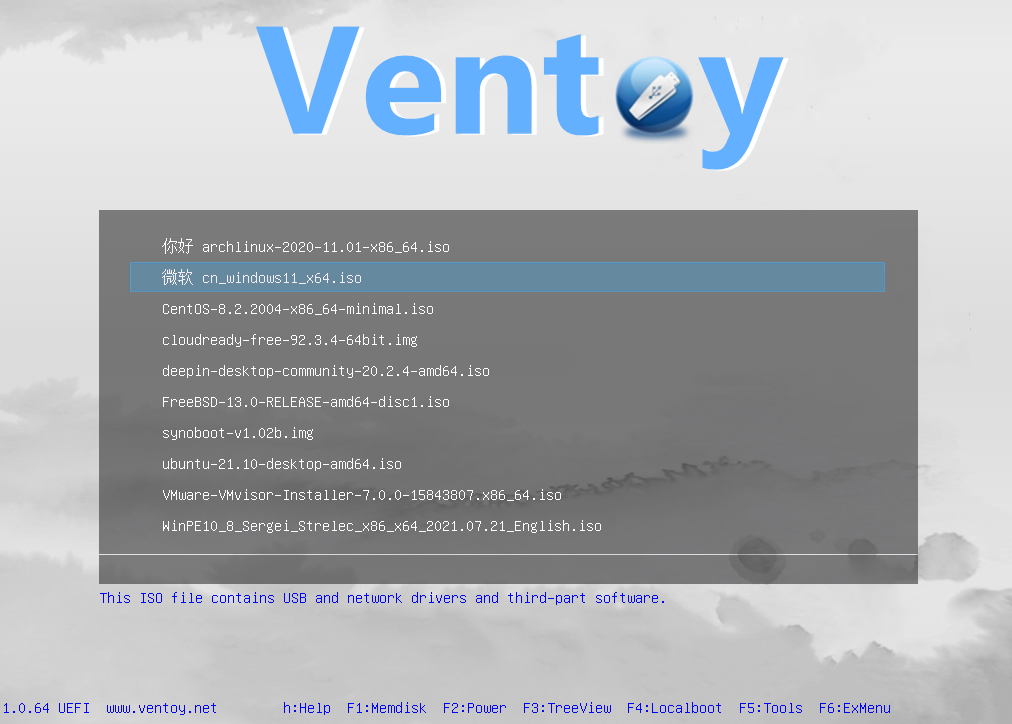Top Related Projects
The Reliable USB Formatting Utility
Flash OS images to SD cards & USB drives, safely and easily.
UNetbootin installs Linux/BSD distributions to a partition or USB drive
WoeUSB is a simple tool that enable you to create your own usb stick windows installer from an iso image or a real DVD. It is a fork of Congelli501's WinUSB.
Quick Overview
Ventoy is an open-source tool for creating bootable USB drives. It allows users to copy multiple ISO files onto a single USB drive and boot from them without the need to format the drive each time. Ventoy supports a wide range of operating systems and is designed to be user-friendly and efficient.
Pros
- Supports multiple ISO files on a single USB drive
- No need to format the USB drive for each new ISO
- Compatible with a wide range of operating systems and UEFI secure boot
- Easy to use with a simple GUI and command-line interface
Cons
- May not work with all hardware configurations
- Some antivirus software may flag it as a potential threat
- Limited customization options for advanced users
- Requires initial setup of the USB drive
Getting Started
- Download the latest version of Ventoy from the official GitHub repository.
- Extract the downloaded package.
- Run the Ventoy2Disk.exe (Windows) or Ventoy2Disk.sh (Linux) application.
- Select your USB drive from the list.
- Click the "Install" button to set up Ventoy on the USB drive.
- Once installation is complete, copy your desired ISO files directly to the USB drive.
- Boot your computer from the USB drive to access the Ventoy menu and select an ISO to boot.
Note: Always backup important data before modifying storage devices.
Competitor Comparisons
The Reliable USB Formatting Utility
Pros of Rufus
- Simpler and more straightforward user interface
- Faster creation of bootable USB drives for single OS installations
- Supports a wider range of bootable media types (e.g., floppy disk images)
Cons of Rufus
- Requires recreating the USB drive for each new OS or update
- Limited to creating single-boot USB drives
- May overwrite existing data on the target USB drive
Code Comparison
Ventoy uses a two-stage boot process:
// ventoy/Ventoy/Src/Core/ventoy_chain.c
int ventoy_chain_boot(VTOY_CHAIN_HEAD *chain)
{
// Load and execute the selected OS image
}
Rufus directly writes the ISO to the USB drive:
// pbatard/rufus/src/drive.c
BOOL WriteDrive(HANDLE hPhysicalDrive, HANDLE hSourceImage)
{
// Write image data to the drive
}
Both projects are open-source and written primarily in C, but Ventoy's architecture allows for multi-boot functionality, while Rufus focuses on single-boot scenarios. Ventoy's approach provides more flexibility for users who need to boot multiple operating systems from a single USB drive, whereas Rufus excels in simplicity and speed for single-OS installations.
Flash OS images to SD cards & USB drives, safely and easily.
Pros of Etcher
- User-friendly GUI for easy bootable USB creation
- Cross-platform support (Windows, macOS, Linux)
- Built-in validation to ensure successful writes
Cons of Etcher
- Requires rewriting the entire USB drive for each new ISO
- Limited to creating single-boot USB drives
- Slower process compared to Ventoy's approach
Code Comparison
Etcher (JavaScript):
const flasher = new Flasher({
image: imagePath,
drive: selectedDrive,
unmountOnSuccess: true,
});
await flasher.flash();
Ventoy (C):
int VentoyFillMBR(int fd, uint64_t DiskSizeInBytes)
{
int rc;
uint64_t Part1Start;
uint64_t Part1End;
uint64_t Part2Start;
uint64_t Part2End;
}
Etcher focuses on a user-friendly approach with a GUI and cross-platform support, making it accessible for less technical users. However, it's limited to single-boot drives and requires rewriting the entire USB for each new ISO.
Ventoy offers a more flexible solution, allowing multiple ISOs on a single drive without rewriting. It's faster for adding new ISOs but has a steeper learning curve for non-technical users.
The code snippets show Etcher's JavaScript-based approach for flashing drives, while Ventoy uses C for low-level disk operations, reflecting their different design philosophies.
UNetbootin installs Linux/BSD distributions to a partition or USB drive
Pros of UNetbootin
- Longer history and wider compatibility with older systems
- Simpler interface for creating single-boot USB drives
- Ability to download and install Linux distributions directly
Cons of UNetbootin
- Limited to creating single-boot USB drives
- Requires separate installation for each OS or distro
- Less flexible for advanced users and multi-boot setups
Code Comparison
UNetbootin (C++):
void unetbootin::runinstusb() {
if (installType == tr("USB Drive"))
{
usbdrive = driveselect->currentText();
targetDev = usbdrive;
installDir = "";
}
}
Ventoy (C):
int VentoyFillMBR(int fd, uint64_t DiskSizeInBytes)
{
int rc;
MBR_HEAD MBR;
rc = read(fd, &MBR, sizeof(MBR));
if (rc != sizeof(MBR))
{
return 1;
}
}
While both projects aim to create bootable USB drives, Ventoy offers a more versatile solution for multi-boot setups and easier management of multiple OS installations. UNetbootin, on the other hand, provides a simpler interface for single-boot scenarios and direct Linux distribution downloads. The code snippets highlight the different approaches, with UNetbootin focusing on USB drive selection and Ventoy handling MBR operations for multi-boot functionality.
WoeUSB is a simple tool that enable you to create your own usb stick windows installer from an iso image or a real DVD. It is a fork of Congelli501's WinUSB.
Pros of WoeUSB
- Specifically designed for creating Windows bootable USB drives
- Simpler interface for users who only need Windows installation media
- Supports both GUI and command-line interfaces
Cons of WoeUSB
- Limited to Windows ISO files only
- Requires separate installation and dependencies
- Less actively maintained compared to Ventoy
Code Comparison
WoeUSB (Bash script excerpt):
if [ ${FILESYSTEM} = "NTFS" ]; then
mkntfs --quick ${DEVICE}
elif [ ${FILESYSTEM} = "FAT" ]; then
mkfs.vfat -F 32 ${DEVICE}
fi
Ventoy (C code excerpt):
static int ventoy_fat_fs_init(void)
{
int rc;
struct fat_fs_info *myinfo;
rc = fat_init();
if (rc) {
vlog("failed to init fat fs %d\n", rc);
return 1;
}
return 0;
}
While both projects deal with creating bootable USB drives, their approaches differ. WoeUSB focuses on Windows-specific functionality using shell scripts, while Ventoy offers a more versatile solution implemented in C, supporting multiple operating systems and allowing for easier updates without reformatting the drive.
Convert  designs to code with AI
designs to code with AI

Introducing Visual Copilot: A new AI model to turn Figma designs to high quality code using your components.
Try Visual CopilotREADME
Ventoy





Ventoy is an open source tool to create bootable USB drive for ISO/WIM/IMG/VHD(x)/EFI files.
With ventoy, you don't need to format the disk over and over, just copy the image files to the USB drive and boot them.
You can copy many image files at a time and ventoy will give you a boot menu to select them.
You can also browse ISO/WIM/IMG/VHD(x)/EFI files in local disk and boot them.
x86 Legacy BIOS, IA32 UEFI, x86_64 UEFI, ARM64 UEFI and MIPS64EL UEFI are supported in the same way.
Both MBR and GPT partition style are supported in the same way.
Most type of OS supported(Windows/WinPE/Linux/Unix/ChromeOS/Vmware/Xen...)
1200+ ISO files are tested (List). 90%+ distros in distrowatch.com supported (Details).
Official Website: https://www.ventoy.net
Tested OS
Windows
Windows 7, Windows 8, Windows 8.1, Windows 10, Windows 11, Windows Server 2012, Windows Server 2012 R2, Windows Server 2016, Windows Server 2019, Windows Server 2022, Windows Server 2025, WinPE
Linux
Debian, Ubuntu, CentOS(6/7/8/9), RHEL(6/7/8/9), Deepin, Fedora, Rocky Linux, AlmaLinux, EuroLinux(6/7/8/9), openEuler, OpenAnolis, SLES, openSUSE, MX Linux, Manjaro, Linux Mint, Endless OS, Elementary OS, Solus, Linx, Zorin, antiX, PClinuxOS, Arch, ArcoLinux, ArchLabs, BlackArch, Obarun, Artix Linux, Puppy Linux, Tails, Slax, Kali, Mageia, Slackware, Q4OS, Archman, Gentoo, Pentoo, NixOS, Kylin, openKylin, Ubuntu Kylin, KylinSec, Lubuntu, Xubuntu, Kubuntu, Ubuntu MATE, Ubuntu Budgie, Ubuntu Studio, Bluestar, OpenMandriva, ExTiX, Netrunner, ALT Linux, Nitrux, Peppermint, KDE neon, Linux Lite, Parrot OS, Qubes, Pop OS, ROSA, Void Linux, Star Linux, EndeavourOS, MakuluLinux, Voyager, Feren, ArchBang, LXLE, Knoppix, Calculate Linux, Clear Linux, Pure OS, Oracle Linux, Trident, Septor, Porteus, Devuan, GoboLinux, 4MLinux, Simplicity Linux, Zeroshell, Android-x86, netboot.xyz, Slitaz, SuperGrub2Disk, Proxmox VE, Kaspersky Rescue, SystemRescueCD, MemTest86, MemTest86+, MiniTool Partition Wizard, Parted Magic, veket, Sabayon, Scientific, alpine, ClearOS, CloneZilla, Berry Linux, Trisquel, Ataraxia Linux, Minimal Linux Live, BackBox Linux, Emmabuntüs, ESET SysRescue Live,Nova Linux, AV Linux, RoboLinux, NuTyX, IPFire, SELKS, ZStack, Enso Linux, Security Onion, Network Security Toolkit, Absolute Linux, TinyCore, Springdale Linux, Frost Linux, Shark Linux, LinuxFX, Snail Linux, Astra Linux, Namib Linux, Resilient Linux, Virage Linux, Blackweb Security OS, R-DriveImage, O-O.DiskImage, Macrium, ToOpPy LINUX, GNU Guix, YunoHost, foxclone, siduction, Adelie Linux, Elive, Pardus, CDlinux, AcademiX, Austrumi, Zenwalk, Anarchy, DuZeru, BigLinux, OpenMediaVault, Ubuntu DP, Exe GNU/Linux, 3CX Phone System, KANOTIX, Grml, Karoshi, PrimTux, ArchStrike, CAELinux, Cucumber, Fatdog, ForLEx, Hanthana, Kwort, MiniNo, Redcore, Runtu, Asianux, Clu Linux Live, Uruk, OB2D, BlueOnyx, Finnix, HamoniKR, Parabola, LinHES, LinuxConsole, BEE free, Untangle, Pearl, Thinstation, TurnKey, tuxtrans, Neptune, HefftorLinux, GeckoLinux, Mabox Linux, Zentyal, Maui, Reborn OS, SereneLinux , SkyWave Linux, Kaisen Linux, Regata OS, TROM-Jaro, DRBL Linux, Chalet OS, Chapeau, Desa OS, BlankOn, OpenMamba, Frugalware, Kibojoe Linux, Revenge OS, Tsurugi Linux, Drauger OS, Hash Linux, gNewSense, Ikki Boot, SteamOS, Hyperbola, VyOS, EasyNAS, SuperGamer, Live Raizo, Swift Linux, RebeccaBlackOS, Daphile, CRUX, Univention, Ufficio Zero, Rescuezilla, Phoenix OS, Garuda Linux, Mll, NethServer, OSGeoLive, Easy OS, Volumio, FreedomBox, paldo, UBOS, Recalbox, batocera, Lakka, LibreELEC, Pardus Topluluk, Pinguy, KolibriOS, Elastix, Arya, Omoikane, Omarine, Endian Firewall, Hamara, Rocks Cluster, MorpheusArch, Redo, Slackel, SME Server, APODIO, Smoothwall, Dragora, Linspire, Secure-K OS, Peach OSI, Photon, Plamo, SuperX, Bicom, Ploplinux, HP SPP, LliureX, Freespire, DietPi, BOSS, Webconverger, Lunar, TENS, Source Mage, RancherOS, T2, Vine, Pisi, blackPanther, mAid, Acronis, Active.Boot, AOMEI, Boot.Repair, CAINE, DaRT, EasyUEFI, R-Drive, PrimeOS, Avira Rescue System, bitdefender, Checkra1n Linux, Lenovo Diagnostics, Clover, Bliss-OS, Lenovo BIOS Update, Arcabit Rescue Disk, MiyoLinux, TeLOS, Kerio Control, RED OS, OpenWrt, MocaccinoOS, EasyStartup, Pyabr, Refracta, Eset SysRescue, Linpack Xtreme, Archcraft, NHVBOOT, pearOS, SeaTools, Easy Recovery Essentional, iKuai, StorageCraft SCRE, ZFSBootMenu, TROMjaro, BunsenLabs, Todo en Uno, ChallengerOS, Nobara, Holo, CachyOS, Peux OS, Vanilla OS, ShredOS, paladin, Palen1x, dban, ReviOS, HelenOS, XeroLinux, Tiny 11, chimera linux, CuteFish, DragonOs, Rhino Linux, vanilladpup, crystal, IGELOS, MiniOS, gnoppix, PikaOS, UwUntu, Noble, PocketHandyBox, DiskGenius, ......
Unix
DragonFly, FreeBSD, pfSense, OPNsense, GhostBSD, FreeNAS, TrueNAS, XigmaNAS, FuryBSD, HardenedBSD, MidnightBSD, ClonOS, EmergencyBootKit, helloSystem
ChromeOS
FydeOS, CloudReady, ChromeOS Flex
Other
VMware ESXi, Citrix XenServer, Xen XCP-ng
Tested Image Report
ãHow to report a successfully tested image fileã
Ventoy Browser
With Ventoy, you can also browse ISO/WIM/IMG/VHD(x)/EFI files in local disk and boot them. Notes
VentoyPlugson
A GUI Ventoy plugin configurator. VentoyPlugson
Features
- 100% open source
- Simple to use
- Fast (limited only by the speed of copying iso file)
- Can be installed in USB/Local Disk/SSD/NVMe/SD Card
- Directly boot from ISO/WIM/IMG/VHD(x)/EFI files, no extraction needed
- Support to browse and boot ISO/WIM/IMG/VHD(x)/EFI files in local disk
- No need to be continuous in disk for ISO/WIM/IMG/VHD(x)/EFI files
- MBR and GPT partition style supported (1.0.15+)
- x86 Legacy BIOS, IA32 UEFI, x86_64 UEFI, ARM64 UEFI, MIPS64EL UEFI supported
- IA32/x86_64 UEFI Secure Boot supported (1.0.07+)
- Linux Persistence supported (1.0.11+)
- Windows auto installation supported (1.0.09+)
- Linux auto installation supported (1.0.09+)
- Variables Expansion supported for Windows/Linux auto installation script
- FAT32/exFAT/NTFS/UDF/XFS/Ext2(3)(4) supported for main partition
- ISO files larger than 4GB supported
- Menu alias, Menu tip message supported
- Password protect supported
- Native boot menu style for Legacy & UEFI
- Most types of OS supported, 1200+ iso files tested
- Linux vDisk boot supported
- Not only boot but also complete installation process
- Menu dynamically switchable between List/TreeView mode
- "Ventoy Compatible" concept
- Plugin Framework and GUI plugin configurator
- Injection files to runtime environment
- Boot configuration file dynamically replacement
- Highly customizable theme and menu
- USB drive write-protected support
- USB normal use unaffected
- Data nondestructive during version upgrade
- No need to update Ventoy when a new distro is released

Installation Instructions
See https://www.ventoy.net/en/doc_start.html for detailed instructions.
Compile Instructions
Please refer to BuildVentoyFromSource.txt
Document
FAQ
See https://www.ventoy.net/en/faq.html for detail
Forum
Donation
It would be much appreciated if you want to make a small donation to support my work!
Alipay, WeChat Pay, PayPal and Bitcoin are available for donation. You can choose any of them.
| Alipay | WeChat Pay |
|---|---|
 |  |
PayPal
You can transfer to my paypal account admin@ventoy.net or just click https://www.paypal.me/ventoy
Bitcoin
Bitcoin Address 19mZDWzZgzkHCi9YX9H3fYCUuCHq3W6wfT
Top Related Projects
The Reliable USB Formatting Utility
Flash OS images to SD cards & USB drives, safely and easily.
UNetbootin installs Linux/BSD distributions to a partition or USB drive
WoeUSB is a simple tool that enable you to create your own usb stick windows installer from an iso image or a real DVD. It is a fork of Congelli501's WinUSB.
Convert  designs to code with AI
designs to code with AI

Introducing Visual Copilot: A new AI model to turn Figma designs to high quality code using your components.
Try Visual Copilot